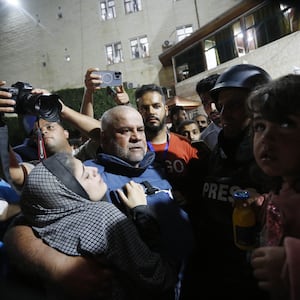Al Jazeera’s Gaza bureau chief fled the country to treat an injury he received from an Israeli airstrike last month, he said on Tuesday.
Wael al-Dahdouh told the AFP that he had crossed the Rafah crossing into Egypt and was en route to Qatar to tend to his wounds. Al-Dahdouh’s departure came weeks after he buried his son, journalist Hamza al-Dahdouh, after another attack on Gaza, a stark reminder of journalists’ risks in covering the Israeli government’s war in Gaza following the Oct. 7 attack.
Four of al-Dahdouh’s surviving children crossed the border last week, according to the AFP. Khaled Elbalshy, the head of Egypt’s top journalist union, thanked the Egyptian government in a Facebook post and said he spoke to al-Dahdouh after he passed the crossing.
“Al-Dahdouh thanked the Egyptian state, all the Egyptian journalists and the Trade Union Council for their support for him and the Palestinian cause,” wrote Elbalshy, the head of the Egyptian Journalists Syndicate. “He also thanked his colleagues in the island for their support, indicating that he will head to Qatar to complete his treatment.”
His departure also came nearly three months after his wife and two of his children were killed in an Israeli airstrike, a fact he learned while on the air.
Israeli and Hamas combatants have paid little regard to journalists covering the war, allowing for the highest death tolls among media workers in a conflict zone in decades. The Committee to Protect Journalists found that 83 journalists and media members have been killed since Oct. 7 as of Tuesday, of which 76 are Palestinians. 16 journalists have been reported injured, while 25 reporters have been imprisoned. Three are missing, according to the CPJ.
More than 24,000 Palestinians have died since the conflict broke out on Oct. 7, according to the United Nations Office for the Coordination of Human Affairs.
“CPJ emphasizes that journalists are civilians doing important work during times of crisis and must not be targeted by warring parties,” said Sherif Mansour, CPJ’s Middle East and North Africa program coordinator, in a statement on its website. “Journalists across the region are making great sacrifices to cover this heart-breaking conflict. Those in Gaza, in particular, have paid, and continue to pay, an unprecedented toll and face exponential threats. Many have lost colleagues, families, and media facilities, and have fled seeking safety when there is no safe haven or exit.”






